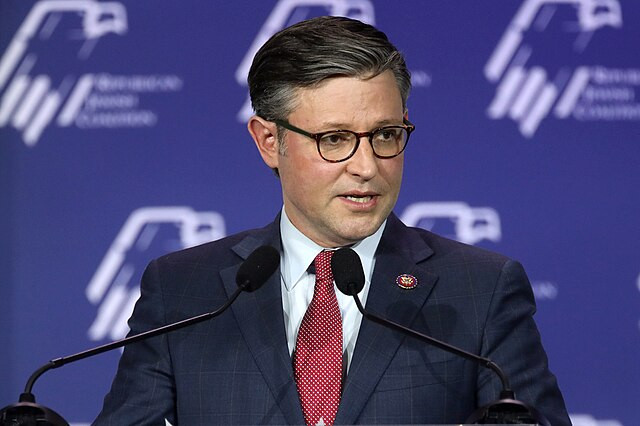House Speaker Mike Johnson is urging the House Ethics Committee not to release a report on allegations involving former Representative Matt Gaetz, marking a controversial intervention that has drawn sharp responses from lawmakers on both sides of the aisle. Johnson's statement, made Friday, came shortly after his return from a meeting with President-elect Donald Trump at Mar-a-Lago. Gaetz, who resigned from Congress earlier this week following Trump's announcement that he would nominate him for attorney general, has consistently denied any misconduct.
"I'm going to strongly request that the Ethics Committee not issue the report because that is not the way we do things in the House, and I think that would be a terrible precedent to set," Johnson said to reporters. The Ethics Committee's probe into Gaetz was investigating serious allegations, including potential sexual misconduct and illicit drug use, among others. Gaetz has maintained his innocence throughout the investigation.
The timing of Johnson's remarks, coming on the heels of his visit with Trump, has raised questions about potential political motivations. Johnson emphasized that he had not discussed the specifics of the matter with Trump and stated that his intervention was about maintaining precedent. "The rules of the House have always been that a former member is beyond the jurisdiction of the ethics committee, and so I don't think that's relevant," Johnson reiterated.
Johnson's intervention has prompted backlash. Senate Majority Whip Dick Durbin (D-IL), who chairs the Senate Judiciary Committee, criticized Johnson's efforts, highlighting the importance of transparency given Gaetz's potential nomination. "There is longstanding precedent for releasing ethics investigation materials after a member resigns, whether in the House or Senate. The now former Congressman shouldn't be able to resign away an ethics investigation involving allegations of grave misconduct," Durbin said. He added that the Senate Judiciary Committee intends to seek access to any relevant materials as part of Gaetz's confirmation process.
The Ethics Committee had been preparing to vote on whether to release its findings this week, sources familiar with the discussions said. However, Republican members of the committee canceled a scheduled meeting after internal deliberations. Some Democrats suspect Gaetz's sudden resignation was strategically timed to avoid the potential release of damaging findings.
Former House Speaker Nancy Pelosi, who previously served on the Ethics Committee, expressed skepticism about the timing. "One would suspect the timing is suspicious because it was a matter of hours before the committee was going to release their report," Pelosi said. Democratic Representative Jamie Raskin echoed the sentiment, arguing that Gaetz's potential appointment as attorney general necessitates full public disclosure of the report. "It defies belief that anyone could become the chief law enforcement officer of the United States of America with an outstanding House Ethics Committee investigative report that doesn't get released," Raskin told reporters.
Johnson's stance marks a shift from earlier statements indicating that the speaker would not involve himself in Ethics Committee matters. "The Speaker of the House is not involved in that, can't be involved in that," Johnson previously told reporters. The reversal has drawn attention, particularly given his recent meeting with Trump.
The Ethics Committee's investigation into Gaetz included allegations of sexual misconduct, misuse of gifts, and potential obstruction of government inquiries. Gaetz has "categorically denied all of the allegations before the Committee," according to a previous statement from the panel. Despite Johnson's push, there is precedent for releasing reports after a member resigns, as seen in past cases such as former Representative William Boner (D-TN).
Lawmakers across the political spectrum, including key senators who will vet Gaetz's nomination, have expressed a desire to see the report. "We cannot allow this valuable information from a bipartisan investigation to be hidden from the American people," Durbin stated. Johnson, meanwhile, continues to argue that maintaining precedent and limiting the committee's jurisdiction to current members is essential for the integrity of the institution.






